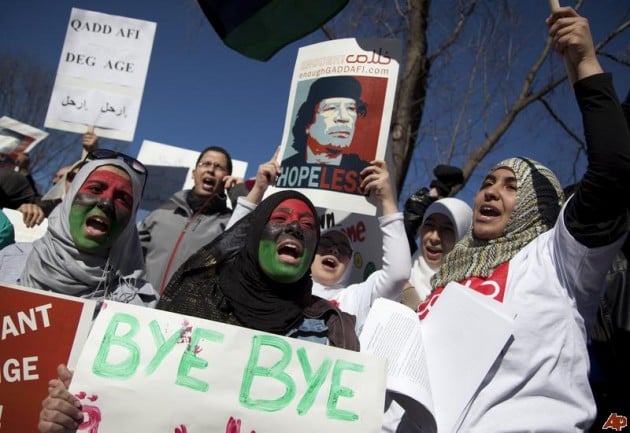Government corruption. High unemployment rates. Escalating food prices. Suppression of freedom. Ever since Egypt’s revolution, many countries throughout the region have instigated their own opposition and started their own protests. Each country is fighting the rebels in their own way, with some hoping for peaceful discussions and others with guns blazing.
Libya
Libya is in revolt. The citizens demand the departure of their current leader, Muammar Gaddafi. Gaddafi is using military forces including foreign mercenaries to suppress the rebels, allowing them to use brute force if necessary. According to CNN, over 2,000 people have been killed.
Despite continued pressure, Gaddafi has not backed down. Heavy bombing took place in Ras Lanuf in efforts to run rebels out of the coastal town, reports ABC News.
“It’s time for liberation,” Gaddafi’s son, Saif al-Islam said in an interview with Reuters. “It’s time for action. We are moving now. Time is out now … we gave them two weeks (for negotiations).”
The United States’ relations with Libya have been strained ever since a 1988 Pan Am jet was bombed and Libya was thought to be behind the event. According to the Chicago Sun-Times, President Barack Obama is considering a “no-fly” zone over Libya.
“I believe Gadhafi is on the wrong side of history,” Obama said during a White House news conference, according to the Chicago Sun-Times. “I believe the Libyan people are anxious for freedom.”
While Gadhafi shows no signs of surrender, each day, tens of thousands of Libyan citizens flee their country as the unrest escalates.
Bahrain
Bahrain’s streets are filled with the shouts of protestors calling for the resignation of the monarchy. According to CNN, the majority of the protestors are Shiite, whereas the Sunni remain in support of the current government.
The San Francisco Chronicle reports that King Hamad bin Isa al-Khalifa and Crown Prince Salman bin Hamad bin Isa al-Khalifa are considering making a political change.
However, forces from neighboring Sunni-ruled Saudi Arabia have been invited into the country to help suppress the uprising, reports BBC News and other sources.
The act points to already strained Sunni-Shiite tensions in the region that are feared to be spreading, and signifies possible rifts between ruling class views on how the protests should be handled.
The crown prince plans to sit down with the opposing political party to allow voices on both sides be heard, details the San Francisco Chronicle.
Meanwhile, CNN reports, the streets continue to echo with the chants of protestors: “The regime must go … Down, down Khalifa.”
Yemen
Like many of its surrounding countries, Yemen is calling for the dismissal of their president, Ali Abdullah Saleh. The citizens are dissatisfied with the current governing officials. According to CNN, Saleh is calling for a sit-down with the opposition, to put an end in the revolt. Already, Saleh has promised not to run in the next elections.
Despite contrary reports, the opposition is not talking with Saleh and his government.
“We will not have any dialogue with the ruling party,” Mohammed al-Qubati, a spokesman for Yemen’s coalition of opposition parties, told CNN. “Our only demand is that this regime leaves and then we can talk about dialogue.”
Protests that took place on Feb. 25 left 11 people killed and 26 injured, CNN reports. Since the protests began, Amnesty International sums the death toll to be 27.
The high unemployment rates and accusations of a corrupt government have also fueled these revolts.
Algeria
Escalating food prices, high unemployment rates, and housing issues are what have stimulated revolts in Algeria. Like in neighboring countries, the citizens of Algeria are calling for the removal of their president, Abdelaziz Bouteflika.
According to the American Free Press, the protests are led by the National Coordination for Change and Democracy. They began their part on Jan. 21 after a riot left five dead and 800 injured.
On Feb. 22, there was some celebrating, reports CNN. On that day, the State of Emergency — which had been in place for 19 years — was lifted. This had restricted freedom of speech and assembly. Bouteflika’s thoughts had been that this allowance of freedom would help alleviate the protests in his country.
Aljazeera, an Arabic news network, reported some of the slogans of the Algerian revolt. As time moves on, there seems to be no halting in the shouts of, “Don’t march on my tranquility and my freedom.”
Iran
“I strongly advise them to let nations have their say and meet their nations’ demands if they claim to be officials of those nations,” said Iranian President Mahmoud Ahmadinejad of leaders quelling protests throughout the region, specifically Libya’s President Muammar Qaddafi.
However, Ahmadinejad’s government has responded harshly to protests and other opposition efforts.
According to Reuters, two people were killed during a Feb. 14 protest, and 1,500 more were arrested. Other incidents include security forces firing into a crowd of protestors — killing one person and injuring several others — and dispersing many groups of protestors with batons and pepper spray, reports CNN.
Two of the opposition’s leaders, Mir-Hossein Mousavi and Mehdi Karroubi, have gone missing, according to the Guardian. Family members say they and their wives were kidnapped by government officials.
The opposition continues to protest and demands the release of Moussavi and Karrubi, calling for protests every Tuesday until they are released.
Iraq
Iraq’s protests are not centered on the government, but rather they are protesting against high unemployment, a crumbling infrastructure, lack of basic services, and corruption, according to CNN.

